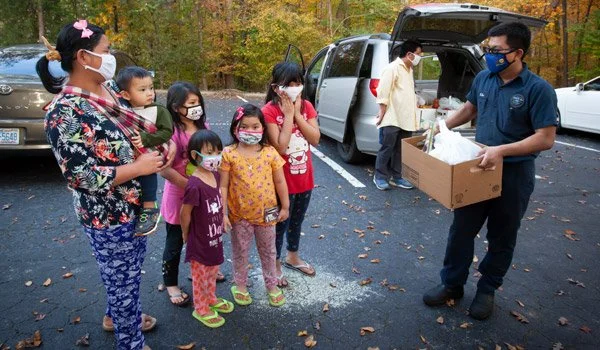International Refugees: A Global Issue Closer Than We Think
Many local businesses in Orange County partner with refugee support organizations to provide resources for local refugees. Source for photo: Chapel Hill Tire Care)
On February 24, 2022 Russia officially launched a large-scale invasion of Ukraine. Russian President Vladimir Putin wanted to promptly absorb Ukraine and reunify what he views as the historic, glorious Russia that he wrote about in a public essay shortly before the invasion. The invasion of Ukraine has had consequences around the world, many of which have worsened as the war has continued. Along with growing fears of rising tensions causing a possible expansion of war across the globe, the invasion has sent almost 8 million refugees into Europe seeking relief from the horror trailing Russian troops as they invaded. Any refugee fleeing to Europe will likely face an extremely dangerous journey, with stories of drowning, suffocation, and heat exhaustion becoming commonplace, especially in border countries like Turkey, Greece, and Italy. Despite the risk, refugees are still fleeing in an attempt to find safety.
This flood of refugees and subsequent European policy reactions brings up many questions political scientists have been debating since the Geneva Convention in 1951. This convention established the definition of a refugee as “someone who is unable or unwilling to return to their country of origin owing to a well-founded fear of being persecuted for reasons of race, religion, nationality, membership of a particular social group, or political opinion.” The United Nations High Commissioner for Refugees, colloquially referred to as the UNHCR, is the global authority charged with protecting and assisting refugees across the world. One of the biggest questions tackled by the UNHCR is not necessarily if we help refugees, rather how we best help refugees.
This question may seem like it has some far away answer in the stormy seas off the Italian coast or the heavily guarded Turkish border. However, the question and its answer applies to the Chapel Hill-Carrboro community more than one may think. The greater triangle area in North Carolina is home to over 8,000 refugees, with Orange County alone housing over 1,200 refugees. Many of the refugees in our local community come from Myanmar (formerly known as Burma) and are members of the Karen or the Chin, which are persecuted ethnic groups. However, the ethnic makeup of refugees in Orange County could quickly change with President Biden’s recent raising of the number of refugees allowed in the United States. Biden exponentially increased this number, bringing it up to 125,000 from the Trump administration's conservative 15,000 refugee cap. The change in number is speculated to be a result of the large number of Ukrainian refugees seeking resettlement mentioned earlier.
This niche group within the population certainly has support within the Orange County community. There are many organizations within walking distance of the University of North Carolina’s campus that provide a variety of services for refugees, including the Refugee Community Partnership and the Refugee Support Center. Many of these centers offer initiatives to help combat language barriers, provide childcare, and attempt to ease the general transition into day to day life in a new community for refugees. While these support groups are certainly warranted and welcomed in the community, they may indicate a lack of support from a policy perspective. Professor Niklaus Steiner, author of International Migration and Citizenship Today and Professor of Political Science at UNC Chapel Hill, believes that “policy-makers often overestimate the amount of support we give [refugees]” and some may even be “a bit over self-congratulatory” concerning the amount of support policy tends to provide refugees. Professor Steiner pointed out that it takes much more than state and federal legislators may realize to achieve the ever coveted “American dream” of resettling and becoming a functioning member of one’s local community, especially for refugees who often bring with them unique trauma and obstacles. While the Orange County community has stepped up to anticipate services refugees might need and supply them, one of the best ways to help refugees is to ensure their struggles and needs are understood by lawmakers in Orange County, Raleigh, and Washington, DC.

